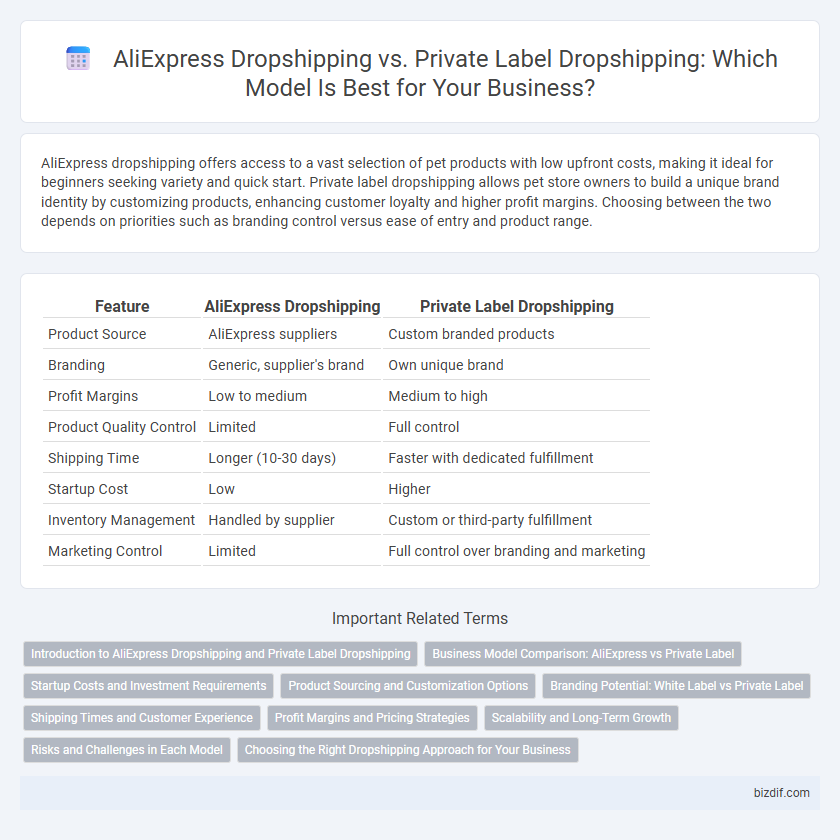AliExpress dropshipping offers access to a vast selection of pet products with low upfront costs, making it ideal for beginners seeking variety and quick start. Private label dropshipping allows pet store owners to build a unique brand identity by customizing products, enhancing customer loyalty and higher profit margins. Choosing between the two depends on priorities such as branding control versus ease of entry and product range.
Table of Comparison
| Feature | AliExpress Dropshipping | Private Label Dropshipping |
|---|---|---|
| Product Source | AliExpress suppliers | Custom branded products |
| Branding | Generic, supplier's brand | Own unique brand |
| Profit Margins | Low to medium | Medium to high |
| Product Quality Control | Limited | Full control |
| Shipping Time | Longer (10-30 days) | Faster with dedicated fulfillment |
| Startup Cost | Low | Higher |
| Inventory Management | Handled by supplier | Custom or third-party fulfillment |
| Marketing Control | Limited | Full control over branding and marketing |
Introduction to AliExpress Dropshipping and Private Label Dropshipping
AliExpress Dropshipping involves sourcing products directly from AliExpress suppliers without holding inventory, allowing entrepreneurs to sell a wide range of items with minimal upfront investment. Private Label Dropshipping requires creating custom-branded products through manufacturers, enhancing brand identity and customer loyalty while maintaining low inventory risk. Both models offer scalable e-commerce solutions but differ significantly in branding control, product differentiation, and profit margins.
Business Model Comparison: AliExpress vs Private Label
AliExpress dropshipping relies on third-party suppliers with a vast product catalog, allowing sellers to start quickly with low upfront costs but limited control over quality and branding. Private label dropshipping involves creating custom-branded products sourced directly from manufacturers, leading to higher profit margins and stronger brand identity. While AliExpress is ideal for testing market demand, private label dropshipping demands investment in product development and supplier relationships for long-term scalability.
Startup Costs and Investment Requirements
AliExpress dropshipping typically requires lower startup costs since it involves selling products directly from suppliers without inventory investment, reducing initial financial risks. Private label dropshipping demands higher investment due to expenses in branding, product design, and quality control to differentiate products in the market. Entrepreneurs choosing private label dropshipping must budget for product development, marketing, and packaging, leading to increased upfront costs compared to AliExpress models.
Product Sourcing and Customization Options
AliExpress dropshipping offers a vast range of products sourced directly from manufacturers and suppliers in China, emphasizing low upfront costs and ease of entry with limited customization options. Private label dropshipping involves sourcing products from manufacturers willing to customize branding, packaging, and sometimes product features, allowing sellers to create unique brand identities with higher profit margins. The choice between the two depends on the level of branding control desired and the willingness to invest time and resources in product personalization.
Branding Potential: White Label vs Private Label
AliExpress dropshipping offers limited branding potential as products are sold under the supplier's brand, restricting customization and customer loyalty opportunities. Private label dropshipping enables entrepreneurs to create unique brand identities by customizing product packaging and designs, fostering stronger brand recognition and higher perceived value. White label products provide pre-manufactured goods that can be rebranded easily, bridging the gap between generic AliExpress listings and fully bespoke private label solutions.
Shipping Times and Customer Experience
AliExpress dropshipping often involves longer shipping times, typically ranging from 15 to 30 days, which can lead to customer frustration and increased support inquiries. Private label dropshipping usually offers faster and more reliable shipping, frequently within 5 to 10 days, improving overall customer satisfaction and repeat purchase rates. Enhancing shipping efficiency and branding through private label dropshipping significantly elevates the customer experience compared to the slower, generic delivery associated with AliExpress.
Profit Margins and Pricing Strategies
AliExpress dropshipping typically offers lower profit margins due to competitive pricing and direct supplier costs, making it ideal for testing products with minimal upfront investment. Private label dropshipping allows for higher profit margins by enabling sellers to set premium prices through unique branding and perceived value. Effective pricing strategies in private label dropshipping focus on differentiation and customer loyalty, while AliExpress dropshipping relies heavily on volume sales and cost-efficiency.
Scalability and Long-Term Growth
AliExpress dropshipping offers low initial investment and a wide product range but faces challenges in scalability due to longer shipping times and limited brand control. Private label dropshipping enables stronger brand identity and higher profit margins, supporting sustainable long-term growth with more control over product quality and customer experience. Investing in private label strategies allows entrepreneurs to scale more efficiently by building customer loyalty and reducing dependency on third-party suppliers.
Risks and Challenges in Each Model
AliExpress dropshipping involves risks such as long shipping times, inconsistent product quality, and supplier reliability issues that can lead to customer dissatisfaction and increased returns. Private label dropshipping presents challenges including higher upfront costs, the need for branding and marketing expertise, and potential inventory management complexities, which require more investment and strategic planning. Both models face challenges in maintaining competitive pricing and ensuring customer trust while balancing supply chain reliability.
Choosing the Right Dropshipping Approach for Your Business
Selecting the optimal dropshipping approach hinges on factors such as product uniqueness, brand control, and profit margins. AliExpress dropshipping offers a low entry cost with a vast product range and minimal upfront investment, ideal for testing markets quickly. Private label dropshipping demands higher initial dedication but enables exclusive branding and greater long-term customer loyalty, which can significantly increase lifetime value and scalability.
AliExpress Dropshipping vs Private Label Dropshipping Infographic

 bizdif.com
bizdif.com